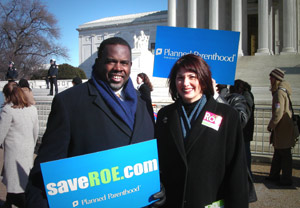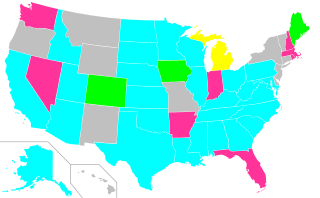Related Research Articles
Roe v. Wade, 410 U.S. 113 (1973), was a landmark decision of the U.S. Supreme Court in which the Court ruled that the Constitution of the United States generally protected a right to have an abortion. The decision struck down many abortion laws, and caused an ongoing abortion debate in the United States about whether, or to what extent, abortion should be legal, who should decide the legality of abortion, and what the role of moral and religious views in the political sphere should be. The decision also shaped debate concerning which methods the Supreme Court should use in constitutional adjudication.
Planned Parenthood v. Casey, 505 U.S. 833 (1992), was a landmark decision of the Supreme Court of the United States in which the Court upheld the right to have an abortion as established by the "essential holding" of Roe v. Wade (1973) and issued as its "key judgment" the restoration of the undue burden standard when evaluating state-imposed restrictions on that right. Both the essential holding of Roe and the key judgment of Casey were overturned by the Supreme Court in 2022, with its landmark decision in Dobbs v. Jackson Women's Health Organization.

The United States abortion-rights movement is a sociopolitical movement in the United States supporting the view that a woman should have the legal right to an elective abortion, meaning the right to terminate her pregnancy, and is part of a broader global abortion-rights movement. The movement consists of a variety of organizations, with no single centralized decision-making body.

Abortion is a divisive issue in the United States. The issue of abortion is prevalent in American politics and culture wars, though a majority of Americans support continued access to abortion. There are widely different abortion laws depending on state.

The Partial-Birth Abortion Ban Act of 2003 is a United States law prohibiting a form of late termination of pregnancy called "partial-birth abortion", referred to in medical literature as intact dilation and extraction. Under this law, any physician "who, in or affecting interstate or foreign commerce, knowingly performs a partial-birth abortion and thereby kills a human fetus shall be fined under this title or imprisoned not more than 2 years, or both". The law was enacted in 2003, and in 2007 its constitutionality was upheld by the U.S. Supreme Court in the case of Gonzales v. Carhart.
Webster v. Reproductive Health Services, 492 U.S. 490 (1989), was a United States Supreme Court decision on upholding a Missouri law that imposed restrictions on the use of state funds, facilities, and employees in performing, assisting with, or counseling an abortion. The Supreme Court in Webster allowed for states to legislate in an aspect that had previously been thought to be forbidden under Roe v. Wade (1973).

Abortion laws vary widely among countries and territories, and have changed over time. Such laws range from abortion being freely available on request, to regulation or restrictions of various kinds, to outright prohibition in all circumstances. Many countries and territories that allow abortion have gestational limits for the procedure depending on the reason; with the majority being up to 12 weeks for abortion on request, up to 24 weeks for rape, incest, or socioeconomic reasons, and more for fetal impairment or risk to the woman's health or life. As of 2022, countries that legally allow abortion on request or for socioeconomic reasons comprise about 60% of the world's population.
Doe v. Bolton, 410 U.S. 179 (1973), was a decision of the Supreme Court of the United States overturning the abortion law of Georgia. The Supreme Court's decision was released on January 22, 1973, the same day as the decision in the better-known case of Roe v. Wade.

Stenberg v. Carhart, 530 U.S. 914 (2000), was a landmark decision of the US Supreme Court dealing with a Nebraska law which made performing "partial-birth abortion" illegal, without regard for the health of the mother. Nebraska physicians who performed the procedure contrary to the law were subject to having their medical licenses revoked. The Court struck down the law, finding the Nebraska statute criminalizing "partial birth abortion[s]" violated the Due Process Clause of the United States Constitution, as interpreted in Planned Parenthood v. Casey and Roe v. Wade.
City of Akron v. Akron Center for Reproductive Health, 462 U.S. 416 (1983), was a case in which the United States Supreme Court affirmed its abortion rights jurisprudence. In an opinion by Lewis F. Powell Jr., the Court struck down several provisions of an Ohio abortion law, including portions found to be unconstitutionally vague.
Milan Vuitch was a physician performing abortions in Washington, D.C., and Silver Spring, Maryland. Born in Serbia, he was a naturalized U.S. citizen.
This is a timeline of reproductive rights legislation, a chronological list of laws and legal decisions affecting human reproductive rights. Reproductive rights are a sub-set of human rights pertaining to issues of reproduction and reproductive health. These rights may include some or all of the following: the right to legal or safe abortion, the right to birth control, the right to access quality reproductive healthcare, and the right to education and access in order to make reproductive choices free from coercion, discrimination, and violence. Reproductive rights may also include the right to receive education about contraception and sexually transmitted infections, and freedom from coerced sterilization, abortion, and contraception, and protection from practices such as female genital mutilation (FGM).
Colautti v. Franklin, 439 U.S. 379 (1979), was a United States Supreme Court abortion rights case, which held void for vagueness part of Pennsylvania's 1974 Abortion Control Act. The section in question was the following:
(a) Every person who performs or induces an abortion shall prior thereto have made a determination based on his experience, judgment or professional competence that the fetus is not viable, and if the determination is that the fetus is viable or if there is sufficient reason to believe that the fetus may be viable, shall exercise that degree of professional skill, care and diligence to preserve the life and health of the fetus which such person would be required to exercise in order to preserve the life and health of any fetus intended to be born and not aborted and the abortion technique employed shall be that which would provide the best opportunity for the fetus to be aborted alive so long as a different technique would not be necessary in order to preserve the life or health of the mother.
United States v. Vuitch, 402 U.S. 62 (1971), was a United States Supreme Court abortion rights case, which held that the District of Columbia's abortion law banning the practice except when necessary for the health or life of the woman was not unconstitutionally vague.
Bigelow v. Virginia, 421 U.S. 809 (1975), was a United States Supreme Court decision that established First Amendment protection for commercial speech. The ruling is an important precedent on challenges to government regulation of advertising, determining that such publications qualify as speech under the First Amendment.

The legality of abortion in the United States and the various restrictions imposed on the procedure vary significantly depending on the laws of each state or other jurisdiction. Some states prohibit abortion at all stages of pregnancy with few exceptions, others permit it up to a certain point in a woman's pregnancy, while others allow abortion throughout a woman's pregnancy. In states where abortion is legal, several classes of restrictions on the procedure may exist, such as parental consent or notification laws, requirements that patients be shown an ultrasound before obtaining an abortion, mandatory waiting periods, and counselling requirements.

Born alive laws in the United States are fetal rights laws that extend various criminal laws, such as homicide and assault, to cover unlawful death or other harm done to a fetus in utero or to an infant that has been delivered. The basis for such laws stems from advances in medical science and social perception, which allow a fetus to be seen and medically treated as an individual in the womb and perceived socially as a person, for some or all of the pregnancy.
Abortion in the U.S. state of Virginia is legal up to the end of the second trimester of a pregnancy. Before the year 1900, abortion remained largely illegal in Virginia, reflecting a widespread trend in many U.S. states during the 19th and early 20th centuries. Abortion was viewed as a criminal act and subject to state laws that prohibited it. However, by 1950, Virginia introduced a legal therapeutic exception, allowing for abortion under specific circumstances, primarily when a woman's physical or mental health was at risk. Notably, the University of Virginia Hospital established a review board in 1950 responsible for evaluating and approving abortion requests, particularly those grounded in psychiatric reasons. This thorough approval process resulted in a significant decrease in the number of abortions performed at the hospital.

The Texas Heartbeat Act, Senate Bill 8, is an act of the Texas Legislature that bans abortion after the detection of embryonic or fetal cardiac activity, which normally occurs after about six weeks of pregnancy. The law took effect on September 1, 2021, after the U.S. Supreme Court denied a request for emergency relief from Texas abortion providers. It was the first time a state has successfully imposed a six-week abortion ban since Roe v. Wade, and the first abortion restriction to rely solely on enforcement by private individuals through civil lawsuits, rather than having state officials enforce the law with criminal or civil penalties. The act authorizes members of the public to sue anyone who performs or facilitates an illegal abortion for a minimum of $10,000 in statutory damages per abortion, plus court costs and attorneys' fees.
Texas abortion statute may refer to one of these laws enacted by the Texas Legislature in the U.S. state of Texas:
References
- ↑ Texas Laws 1854, c. 49, § 1, set forth in 3 H. Gammel, Laws of Texas 1502 (1898).
- ↑ See Texas Penal Code of 1857, c. 7, Arts. 531-536; G. Paschal, Laws of Texas, Arts. 2192-2197 (1866); Texas Rev.Stat., c. 8, Arts. 536-541 (1879); Texas Rev.Crim.Stat., Arts. 1071-1076 (1911).
- ↑ Roe v. Wade, 410 U.S. 113, 119 (1973)
- ↑ Jackson v. State, 55 Tex.Cr.R. 79, 89, 115 S.W. 262, 268 (1908)
- ↑ Thompson v. State (Ct.Crim.App. Tex.1971), appeal docketed, No. 71-1200.
- ↑ Id., note 2.